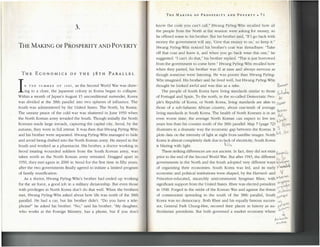
Porque fracasan los países.pdf
- 1. 3. THE MAKING OF PROSPERITY AND POVERTY THE EcoNOMICS OF THE 38TH PARALLEL IN T H E s u M M E R o F 194 s, as the Second World War was draw ing to a clase, the Japanese colony in Korea began to collapse. Within a month of Japan's August 15 unconditional surrender, Korea was divided at the 38th parallel into two spheres of influence. The South was administered by the United States. The North, by Russia. The uneasy peace of the cold war was shattered in June 1950 when the North Korean army invaded the South. Though initially the North Koreans made large inroads, capturing the capital city, Seoul, by the autumn, they were in full retreat. It was then that Hwang Pyóng-Wón and his brother were separated. Hwang Pyóng-Wón managed to hide and avoid being drafted into the North Korean army. He stayed in the South and worked as a pharmacist. His brother, a doctor working in Seoul treating wounded soldiers from the South Korean army, was taken north as the North Korean army retreated. Dragged apart in 1950, they met again in 2000 in Seoul for the first time in fifty years, after the two governments finally agreed to initiate a limited program of family reunification. As a doctor, Hwang Pyóng-Wón's brother had ended up working for the air force, a good job in a military dictatorship. But even those with privileges in North Korea don't do that well. When the brothers met, Hwang Pyóng-Wón asked about how life was north of the 38th parallel. He had a car, but his brother didn't. "Do you have a tele phone?" he asked his brother. "No," said his brother. "My daughter, who works at the Foreign Ministry, has a phone, but if you don't THE MAKING OF PROSPERITY AND PovERTY • 71 know the code you can't call." Hwang Pyóng-Wón recalled how al! the people from the North at the reunían were asking for money, so he offered sorne to his brother. But his brother said, "If I go back with money the government will say, 'Give that money to us,' so keep it." Hwang Pyóng-Wón noticed his brother's coat was threadbare: "Take off that coat and leave it, and when you go back wear this one," he suggested. "I can't do that," his brother replied. "This is just borrowed from the government to come here." Hwang Pyóng-Wón recalled how when they parted, his brother was ill at ease and always nervous as though someone were listening. He was poorer than Hwang Pyóng- Wón imagined. His brother said he lived well, but Hwang Pyóng-Wón thought he looked awful and was thin as a rake. �l"t'l'te" The people of South Korea have living standards similar to those t"lJ,u of Portugal and Spain. To the north, in the so-called Democratic Peo- Je ple's Republic of Korea, or North Korea, living standards are akin to Co..'<SO those of a sub-Saharan African country, about one-tenth of average 'c'Y�i living standards in South Korea. The health of North Koreans is in an J,d even worse state; the average North Korean can expect to live ten µ,)e years less than his cousins south of the 38th parallel. Map 7 (page 72) � illustrates in a dramatic way the economic gap between the Koreas. It � "-. J ! .._.vi' plots data on the intensity of light at night fr om satellite images. North Korea is almost completely dark due to lack of electricity; South Korea tt._.c. is blazing with light. These striking differences are not ancient. In fact, they did not exist !) aJ:_7 ! prior to the end of the Second World War. But after 1945, the different �,o. governments in the North and the South adopted very different ways '1¿.,,{.;.rw • of organizing their economies. South Korea was led, and its early �... economic and political institutions were shaped, by the Harvard- and J Princeton-educated, staunchly anticommunist Syngman Rhee, with t,Ap.vw) hl""' significant support from the United States. Rhee was elected president 0·� in 1948. Forged in the midst of the Korean War and against the threat c.:�¡ c1 :> 1 of communism spreading to the south of the 38th parallel, South ().J)� 1 Korea was no democracy. Both Rhee and his equally famous succes- "' sor, General Park Chung-Hee, secured their places in history as au- (''."'....'> thoritarian presidents. But both governed a market economy where � A,-o¡,;"' '(I' "'º